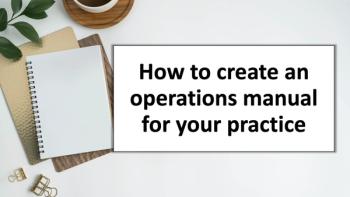
Administration: Handling Tech Sales Reps Like a Pro
You thought it was tough dealing with pharmaceutical reps? Technology vendors are multiplying quickly - and so are their sales reps. We’re here to help.
Depending on the type and size of your practice, technology procurement can either be an effortless or daunting task. Academic-based and hospital-affiliated practices often see very few invoices for office hardware or software solutions, as they are part of larger networks that work to negotiate the contracts and handle the support necessary to purchase and maintain PCs, printers, phone systems, and the like.
Unfortunately, smaller, private practices often lack a cadre of dedicated purchasing agents and IT gurus. Office managers at smaller practices are often left to their own wits when having to contend with omnipresent technology sales reps hawking the next greatest gizmo.
But fear not. Small practice office managers are far from helpless. You don’t need a doctorate in computer science to cut through techno-sales hype and make appropriate purchasing decisions. The more technologically savvy office managers become (a trait now often expected by their employers), the more the advantage tilts in favor of the consumer. With a few simple strategies, you can play ball with the biggest boys on the technology sales block. These tips should help you secure some higher negotiating ground:
Handle all salespeople and representatives professionally. The old adage that “first impressions are lasting impressions” still holds true for everyone with whom you do business. When meeting a salesperson for the first time, remember that he may have just left an existing client who recently signed a six-figure deal and is now meeting with you for a $1,000 deal, or vice versa. That’s not always readily apparent, and neither are the experience, expertise, and tech-savvy levels of different salespeople. Establish immediate credibility by always greeting and welcoming him into your office, when he has an appointment. Be honest and upfront about where your practice stands from a technology perspective, and let the rep know that you are open to any cost-effective solutions that could increase your practice’s efficiency.
Schedule appointments. Akin to treating sales representatives professionally, always schedule specific times to sit down with them to discuss your office’s needs. At small practices, salespeople often “cold call” (that is, stop by without making an appointment). If this happens to you, simply thank them for stopping by, take their card, and schedule a future time for their visit, assuming you have some interest in the product, or think you might in the future. This way, you can give your full attention to their products rather than trying to simultaneously check patients in and out, take copays, and cover for your front-desk staff during coffee breaks. Ask representatives to e-mail or fax you a list of the specific questions they have about your office to make their upcoming visit a more effective use of everyone’s time.
Insist on solid arguments backed by quantifiable data. Whether you are purchasing a server, a phone system, or another piece of technology, put the burden of proof on the salesperson. Ask for prepared, detailed documents on the products that interest you. This information should be written in laymen’s terms, detail how the product would fit into your practice’s work flow, describe its specific benefits, and provide rough cost estimates. Pressure the salesperson to provide descriptions of previous implementations of her products at practices similar to your own. Never be shy to ask to borrow a demo of the product, if applicable. Be wary of those who offer only anecdotal evidence of their product’s efficacy, no matter how good it sounds. Solid facts and a personal test drive are crucial to making good purchasing decisions.
Learn to play “the deadline game.” Even good salespeople will stretch the truth sometimes, especially when it comes to meeting their sales quotas. An oft-used weapon in a salesperson’s negotiating arsenal is the deadline. As a consumer, you must be able to distinguish real deadlines from fake ones. Be aware that salespeople are often more willing to negotiate costs and terms as specific dates approach. For example, most salespeople have a quarterly goal they must meet. Therefore, they will be much more willing to negotiate, make concessions, or throw in free add-ons near the close of each sales quarter. These quarters are based on a company’s fiscal year, which may not necessarily match the calendar year. As a salesperson feels her end-of-quarter pressure bearing down, you may be able to increase a standard 5 percent discount to 20 percent. But only if you know what such cutoff dates are. Simply ask your rep during casual conversation if his fiscal year matches the calendar year. If not, when does it end?
Resist the siren call of reps who insist, “This deal is only good today,” a typical ploy of high-pressure sales reps. Conscientious salespeople will not resort to such ultimatums; in fact, such deadlines are typically untrue. When sales reps start to exert pressure by using short deadlines (one or two days), you can usually take this as a red flag. Exercise extreme caution before entering into any contract with such a salesperson.
Don’t be afraid to walk away. Until a contract is signed, you are under no obligation to buy, no matter how many boxes of donuts the sales rep has brought into your office. Salespeople are accustomed to rejection. You, however, are probably not accustomed to rejecting. Sales reps sometimes depend on your aversion to feeling guilty in order to close a deal. A certain technology may have looked good at first, but if toward the end of your negotiations you realize the product or service just isn’t a good fit for your practice, simply explain your position and end the deal. Don’t let high-pressure sales staff bully you into signing a contract for something you don’t need. A reputable salesperson won’t force you to purchase something that isn’t right for you or your practice.
Do your homework. Is the technology you are considering up-to-date? How flexible is it? Can it be expanded as your business needs change? What other companies offer competing products, and how do their features differ? Is this company fiscally sound? What technical support does the company offer post-purchase? These are all important questions you can answer easily, regardless of your technical know-how. Search the Internet for Web sites that offer objective reviews on the products you’re considering, such as www.epinions.com. Read everything, but be aware that even large vendors may “plant” positive product information in Internet chat rooms and on other Web sites by posing as consumers. Still, taking time to educate yourself about a major purchasing decision will pay off. At the very least, you’ll become familiar with the jargon surrounding your product, which will make you appear much better informed than the average consumer. Salespeople are often caught off guard by potential customers who know the terminology and brand names of a given product line. Any salesperson is sure to proceed with caution with a prospective client familiar with their lexicon, even if you don’t know the difference between a 100bT and a Gigabit.
Personality doesn’t always matter. Don’t dismiss a product just because you don’t hit it off with the salesperson right away. Sales staff struggle to be all things to all people, sometimes covering territories that span several states. So a sales rep may speak with a North Carolina accent in your upstate New York office. Her glittery fashion sense may clash with your conservative bent toward neutral colors. He may prefer NASCAR to your beloved football. He may not be someone you’d choose as a friend. But that doesn’t matter. The purpose of your relationship is to agree on a fair deal for a product you need, with sufficient continuing support after the sale.
Insist on a contract. Whether a potential vendor is your practicing physician’s friend from church who owns a computer consulting company, or a faceless contact you located on the Internet, a contract is always necessary. Contracts need not be lengthy to be effective; a simple one-page agreement can go a long way to protect all parties. When dealing with technology products, be certain that any contract covers the following topics, at minimum:
- Hardware: Warranty/repair stipulations should be delineated for all components, including who will actually perform necessary repairs. Ensure all your questions are addressed, such as “Is the monitor attached to the ultrasound unit also covered under your 24-hour replacement guarantee?” or “Who is responsible for paying the shipping costs if I have to return a unit for repairs?”
- Software: Know what upgrades you are entitled to and how often they are released. Are they free? Say you’re considering adding another physician to your practice next year. Can you lock pricing in for that physician’s use of the product now? What if a physician retires or leaves your practice? How will you be reimbursed for his software license? Is remote support available? Carefully outline all your questions beforehand, and make sure you are satisfied with the answers you receive.
- Services: Be certain the contract spells out in detail exactly what is expected of your vendor. For example, a contract to rewire seven offices should not simply read, “rewire offices.” Rather, it should specify, “Seven offices rewired, which includes installing network wall jacks, punching wire into punch panel in wire closet, and testing/certifying that each jack is able to carry 100bT Ethernet.”
- Post-Sale: Be sure the contract lists specific contact names and phone numbers for those you will need to call on for support, future upgrades, and modifications.
- Returns: Most vendors are willing (during negotiations) to incorporate into your contract a return guarantee of some sort, often 15 or 30 days after purchase (except for customized products). Try to convince your vendor to include such a clause, and be certain it outlines the steps for making such a return and details the requirements that must be met to allow a product return.
- Remediation: Inevitably, some deals go bad, even if both parties have the best intentions. Be certain to read what remedies - financial and otherwise - are available if your product installation goes wrong. Many contracts call for “independent arbitration” to resolve disputes. If your contract specifies this, be cautious of any fine print regarding the location of the arbitration, how complaints are to be filed, etc.
Team up. Before you begin any serious negotiations, ask your supervising physician to set up a well-worn but oft-effective police tactic - the good cop/bad cop scenario. This can provide you with some additional negotiating leverage. Car salespeople do this routinely - he wants to make the deal that cheap, but darn it, his manager just won’t let him. You can say the same thing about your supervising physician.
For negotiation newbies, this practice can help ease negotiating’s discomfort factor, allowing you to keep a positive, upbeat relationship with the rep. For example, if the deal comes down to you wanting an additional five percent reduction in total cost, simply say, “I really feel this [insert product name here] would help us, but our primary physician/owner just won’t let me buy it at this price. Can we get to a lower overall cost so we can complete our business today?” Be forewarned, though: Never attempt this tactic without informing your “bad cop” of your plan. It would be the ultimate backfire if you employed this tactic unbeknownst to your “bad cop” partner, and then your sales rep and that supposedly “bad cop” meet one another on the golf course the following weekend.
Check references. Regardless of whether a sales rep is selling long-distance service, routers, PCs, handheld computers, or X-ray equipment, no salesperson concerned with maintaining a good reputation would refuse to give you references from existing customers. Once you have the list of these references, don’t just file it away; call three or four and ask to schedule a time to talk with them about your pending purchase.
Before you call, write down the questions you want to ask. Several that should always be on your list regardless of what you’re buying are: How long have you used this company’s products or services? Do you still consider your decision to buy this product or use this service a good one? Have you ever experienced any problems with this company? How did your representative help you resolve any problems you’ve had with the product? How has this product/service helped your practice? Would you buy from this company again?
Above all, remember that as the practice manager, you are ultimately accountable when it comes to purchasing technology equipment or services for your physician’s practice, even if final approval lies with your supervisor. While most salespeople are honest professionals, don’t stake your job on the word of someone who takes you out to a free lunch. If you make a wrong decision because you didn’t do your homework, you will bear the blame. But if you master some tricks of the sales trade, prepare well, and go through each negotiation step carefully and thoughtfully, you’ll soon be shaking hands with your seller, confidently stating, “It’s a deal.”
Jonathan McCallister is a freelance writer based in Huntington, WV. He has directed technology operations for a 60+ provider multispecialty group for more than seven years. He can be reached via
This article originally appeared in the October 2006 issue of Physicians Practice.
Newsletter
Optimize your practice with the Physicians Practice newsletter, offering management pearls, leadership tips, and business strategies tailored for practice administrators and physicians of any specialty.








